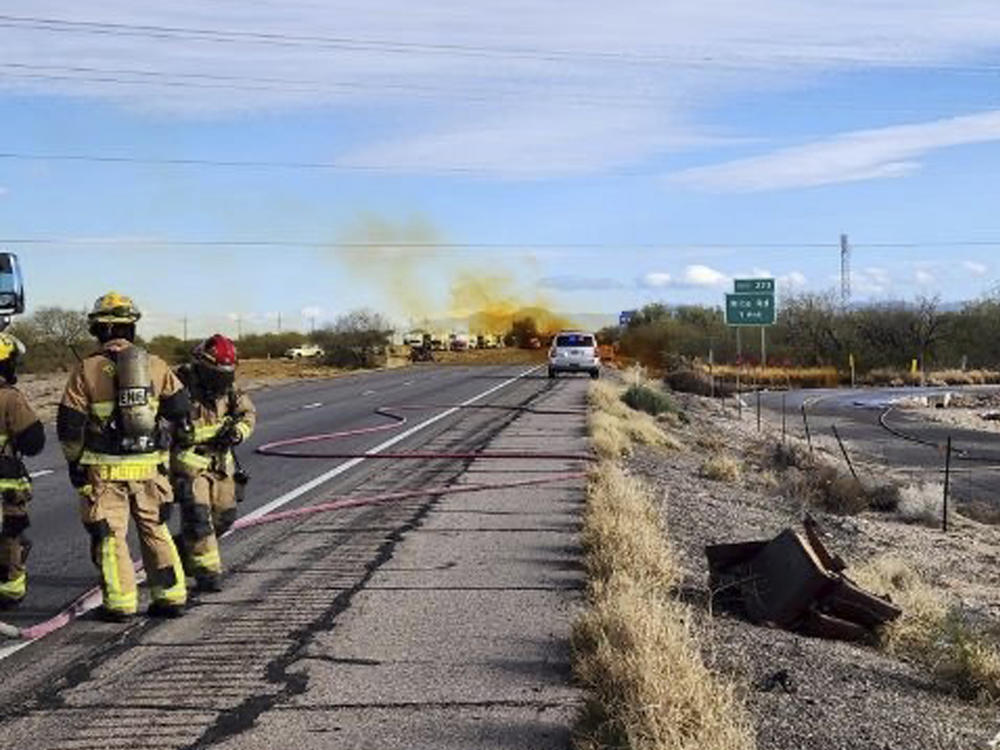Section Branding
Header Content
A hazardous spill in Arizona closes down an interstate and forces an evacuation
Primary Content
Updated February 15, 2023 at 3:07 PM ET
TUCSON, Ariz. — A portion of the main freeway that runs through the southern Arizona desert and links the state's two largest cities remains closed outside Tucson on Wednesday morning, a day after a deadly crash caused a hazardous material leak and forced evacuations nearby.
Residents within a half mile of the crash on Interstate 10 southeast of downtown Tucson were ordered to leave, and those within 3 miles were told to shelter in place after liquid nitric acid was determined to be leaking from the truck tractor pulling a box trailer, the Arizona Department of Public Safety said. The acid sent up eerie yellow and red plumes over the asphalt roadway that runs through dry land scattered with scrub brush.
A 1-mile shelter-in-place order was lifted Tuesday night, but officials reinstated it early Wednesday morning, saying more nitric acid was released as crews tried to remove the load and later expanded the perimeter. Area residents were told to turn off heaters and air conditioning systems that bring in outside air. The area would be monitored to assess the need for possible changes to these orders, officials said, noting that those who evacuated should expect to be displaced until midday.
The weather temporarily impeded hazardous material recovery and mitigation efforts overnight. But officials said Wednesday morning that the material had been removed from the truck, and crews were using dirt to keep more nitric acid from being released.
The driver of the truck was killed, the department said, but few other details were released.
The agency warned motorists in the Tucson area should anticipate impacts on their Wednesday morning commute in and around I-10.
"This will be an extended closure," it said in a tweet Tuesday evening.
The University of Arizona Tech Park was among the areas evacuated. Some schoolchildren in Rita Ranch were among those who sheltered in place, the Arizona Daily Star reported. Officials canceled classes at several nearby schools on Wednesday.
What is nitric acid?
Nitric acid is used to make ammonium nitrate for fertilizers and in the manufacture of plastics and dyes.
The Centers for Disease Control and Prevention's website says nitric acid is a highly corrosive, colorless liquid with yellow or red fumes and can cause an acrid smell.
It says exposure to nitric acid can irritate the eyes, skin and mucous membranes. Depending on how long someone is exposed to the material, and how much, it also can cause delayed pulmonary edema, pneumonitis, bronchitis and dental erosion.
Pima County's health department and poison control center on Wednesday recommended that anyone who may have been in contact with the gas for more than 15 minutes get a medical evaluation if they develop respiratory difficulties like wheezing or shortness of breath. They said symptoms could be delayed up to 24 hours after exposure.
Health officials said it is possible that some people living within a mile of the accident may have been exposed to the material for more than 15 minutes if the building where they were sheltering in place was using an air conditioner or heater pulling in air from the outside. But they said that people who simply drove through or past the accident and chemical plume should not have been affected.
This hazardous crash comes as Ohio residents continue to raise concerns about the release of toxic chemicals on board a freight train that derailed Feb. 3 and left 50 cars in a fiery, mangled mess. There were no injuries but officials later ordered the evacuation of the immediate area. Residents are worried about the potential health impacts from the wreckage.
Copyright 2023 NPR. To see more, visit https://www.npr.org.

